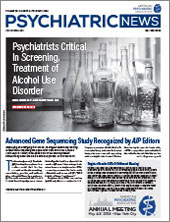As child and adolescent psychiatry fellows, we are often reminded of our work after our days are done. Even relaxing by watching a favorite reality television show makes us think of our training. A commercial may air for a mood medication that reminds us of the thorough education we’ve received from supervisors and mentors about prescribing, but we may also receive stark reminders of significant gaps in our medical training. Commercials advertising mobile apps designed to improve mood and sleep, for example, seem to run just as frequently as ads for medications approved by the Food and Drug Administration (FDA). Both medications and digital apps target similar symptoms and are marketed directly to consumers. Our patients could question us about either of these options during consultations, yet our training has prepared us to speak about only one of them.
There are options for practicing psychiatrists who need guidance on mental health apps, such as
APA’s App Advisor. But many residency and fellowship programs are missing a crucial opportunity to train the next generation of psychiatrists to guide their patients through the labyrinth of digital mental health care options available. It is time to commit to the development of curriculum, research, and advocacy to familiarize and train psychiatry residents and fellows to be competent in digital psychiatry.
Many children face barriers to accessing traditional therapy, including time and financial constraints, long waiting lists, and a scarcity of trained professionals. This significant need for care among youth underscores the urgency to explore innovative therapeutic options, including digital solutions like the apps patients see advertised on television. As health care professionals, recognizing and adapting to these evolving treatment modalities are crucial to providing comprehensive care.
The development of digital technologies is having a large impact on mental health care. Some are practical tools like medication reminders and symptom trackers. Others offer online consultations and advanced therapies like virtual reality and serious games (games that are designed to educate or change behaviors). The widespread use of smartphones makes app-based platforms a convenient treatment option for patients, regardless of their location or schedule. This was particularly important to many patients during the COVID-19 pandemic, when social distancing was essential. Despite advancements, the quality of digital mental health tools is varied. Some companies offer evidence-based therapies, while others present products that are less clearly so or are even ethically ambiguous.
For many physicians, the term “digital health” is synonymous with telemedicine or electronic medical records, rather than including therapeutic apps or comprehensive treatment services accessible via a phone. Patients expect their doctors to guide them through the digital mental health landscape, not realizing that the physicians might be as unfamiliar with it as they.
Today’s trainees are in a prime position to address this challenge. We have grown up with technology and are generally more adept with it than our senior colleagues. Many of us have personal experiences with mental health apps. We have the opportunity to use our training to develop expertise in digital psychiatry, benefiting our patients and contributing to the field. For this to happen, residency and fellowship programs need to prioritize education in digital psychiatry. We require mentorship, exposure, and structured training to confidently recommend digital health solutions to our patients, just as we do with pharmaceutical and lifestyle recommendations.
This task is challenging, but vital. By embracing digital mental health in our academic training, we can better care for our patients and drive innovative change. If we fail to adapt, we risk being left behind in the rapidly evolving health care landscape.

